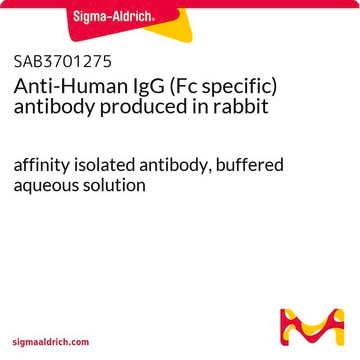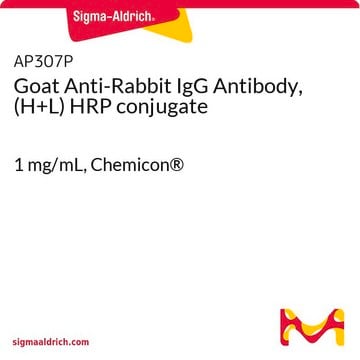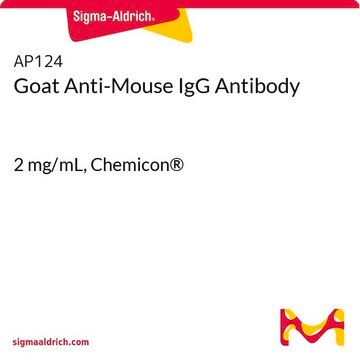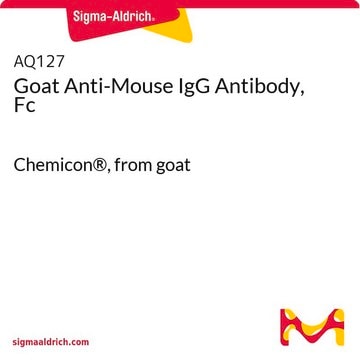AP127
Goat Anti-Mouse IgG Antibody, Fc
2.4 mg/mL, Chemicon®
Faça loginpara ver os preços organizacionais e de contrato
About This Item
Código UNSPSC:
12352203
eCl@ss:
32160702
NACRES:
NA.46
Produtos recomendados
fonte biológica
goat
Nível de qualidade
conjugado
unconjugated
forma do anticorpo
affinity purified immunoglobulin
clone
polyclonal
reatividade de espécies
mouse
fabricante/nome comercial
Chemicon®
concentração
2.4 mg/mL
técnica(s)
ELISA: suitable
immunoprecipitation (IP): suitable
western blot: suitable
Condições de expedição
wet ice
modificação pós-traducional do alvo
unmodified
Descrição geral
Immunoglobulin G (IgG), is one of the most abundant proteins in human serum with normal levels between 8-17 mg/mL in adult blood. IgG is important for our defence against microorganisms and the molecules are produced by B lymphocytes as a part of our adaptive immune response. The IgG molecule has two separate functions; to bind to the pathogen that elicited the response and to recruit other cells and molecules to destroy the antigen. The variability of the IgG pool is generated by somatic recombination and the number of specificities in an individual at a given time point is estimated to be 1011 variants.
Aplicação
Detect Mouse IgG using this Goat anti-Mouse IgG Antibody, Fc validated for use in ELISA, IP & WB.
forma física
Affinity purified immunoglobulin. Liquid. Buffer = 0.01% Sodium Phosphate, 0.25 M NaCl, pH 7.6
Armazenamento e estabilidade
Store at +2-8°C in undiluted aliquots for up to six months, sterile conditions.
Informações legais
CHEMICON is a registered trademark of Merck KGaA, Darmstadt, Germany
Código de classe de armazenamento
12 - Non Combustible Liquids
Classe de risco de água (WGK)
WGK 2
Ponto de fulgor (°F)
Not applicable
Ponto de fulgor (°C)
Not applicable
Certificados de análise (COA)
Busque Certificados de análise (COA) digitando o Número do Lote do produto. Os números de lote e remessa podem ser encontrados no rótulo de um produto após a palavra “Lot” ou “Batch”.
Já possui este produto?
Encontre a documentação dos produtos que você adquiriu recentemente na biblioteca de documentos.
Different rates of glycolysis affect glycolytic activities and protein properties in turkey breast muscle.
S Eadmusik,C Molette,H Remignon,X Fernandez
Animal : An International Journal of Animal Bioscience null
Sarwish Rafiq et al.
Nature biotechnology, 36(9), 847-856 (2018-08-14)
The efficacy of chimeric antigen receptor (CAR) T cell therapy against poorly responding tumors can be enhanced by administering the cells in combination with immune checkpoint blockade inhibitors. Alternatively, the CAR construct has been engineered to coexpress factors that boost
Miles C Scotcher et al.
Monoclonal antibodies in immunodiagnosis and immunotherapy, 32(1), 6-15 (2013-04-23)
Botulinum neurotoxins (BoNT) are produced by Clostridium botulinum and cause severe neuroparalytic disease that if not treated quickly is often fatal. The toxin is produced as a 150 kDa precursor protein (holotoxin) that is enzymatically cleaved to form two subunits, heavy
Miles C Scotcher et al.
PloS one, 5(6), e11047-e11047 (2010-06-16)
Botulinum neurotoxin (BoNT), the causative agent of botulism, a serious neuroparylatic disease, is produced by the anaerobic bacterium Clostridium botulinum and consists of a family of seven serotypes (A-H). We previously reported production of high-affinity monoclonal antibodies to BoNT serotype
Larry H Stanker et al.
Toxins, 5(11), 2212-2226 (2013-11-21)
Botulism is a serious foodborne neuroparalytic disease, caused by botulinum neurotoxin (BoNT), produced by the anaerobic bacterium Clostridium botulinum. Seven toxin serotypes (A-H) have been described. The majority of human cases of botulism are caused by serotypes A and B
Nossa equipe de cientistas tem experiência em todas as áreas de pesquisa, incluindo Life Sciences, ciência de materiais, síntese química, cromatografia, química analítica e muitas outras.
Entre em contato com a assistência técnica







